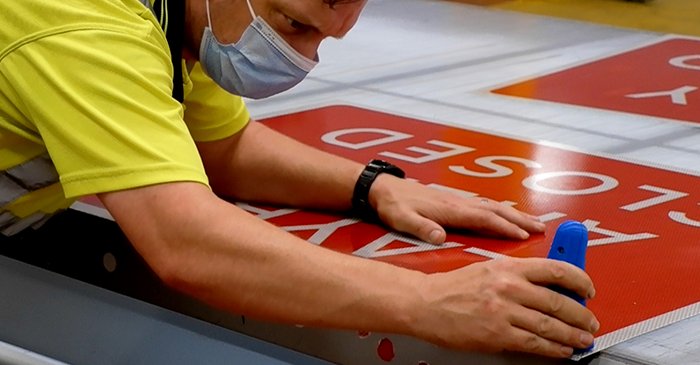National Manufacturing Institute Scotland
Scotland's Bravest Manufacturing Company
Ergonomic 3D printed sign-cutting tool drives productivity and inclusivity for social enterprise
Scotland's Bravest Manufacturing Company (SBMC) is a social enterprise that provides employment opportunities for veterans who may need support adjusting to life after service, and others with disabilities in Scotland.
Based in Bishopton, Renfrewshire, the enterprise offers a range of products and services, including manufacturing signs for the highways, transport and commercial industries.
Challenge
Manufacturing a sign typically involves trimming vinyl material printed with the sign imagery in line with a metal or composite backing. This process is generally done by hand using scissors and scalpel blades, which can be time-intensive and prone to human error.
SBMC was looking for an alternative approach to this process, which was particularly challenging for employees with certain disabilities, low dexterity, and a lack of confidence in using blades.
How did NMIS help?
The NMIS Design Engineering team developed a new sign-trimming tool to speed up the sign finishing process and enable more SBMC employees to undertake the task.
First, the team worked to understand SBMC's requirements through online information-gathering sessions due to COVID-19 restrictions that prevented site visits. Subsequently, feedback from NMIS engineers and SBMC operators was compared against product requirements before a design concept was selected for further development.
The concept featured:
- Ergonomic handle for improved comfort and control of blade when cutting
- Fixed guide surfaces for reduced variation when cutting by maintaining the blade at the correct orientation and cutting angle
- Removable guard to safely conceal the blade from the operator
- Encapsulated scalpel to leverage the low cost availability and consistency of off-the-market scalpels
Following concept development, the team collaborated with the University of Strathclyde's Department of Biomechanical Engineering to create multiple clay models incorporating key ergonomic and human factors. A 3D model was created based on the clay models, which the NMIS Machining and Additive Team 3D printed using the Stratasys F900 machine.

Robert Lappin, Veteran Welfare Development Manager at Scotland's Bravest Manufacturing Company, commented:
This was an extremely worthwhile undertaking that provided us with a solution to a genuine workplace problem.
"The collaborative approach also taught us about the design process and it was rewarding for the operators involved who contributed their own thoughts and experience, which informed the final design.
Business impact
Increased numbers of SBMC employees are now engaging in sign trimming after being held back due to individual disabilities or lack of confidence. It is hoped this will enhance productivity as, for those with lower dexterity or disability, the task can be performed with greater ease and speed while meeting the required quality standards.
There is also potential to commercialise the product design by manufacturing it on a larger scale and selling it to other companies working in the signage industry interested in providing inclusive opportunities for staff.
Undergoing the product development process with NMIS has also provided SBMC employees with new skills and understanding, allowing them to identify future opportunities for design and manufacturing process improvements.
